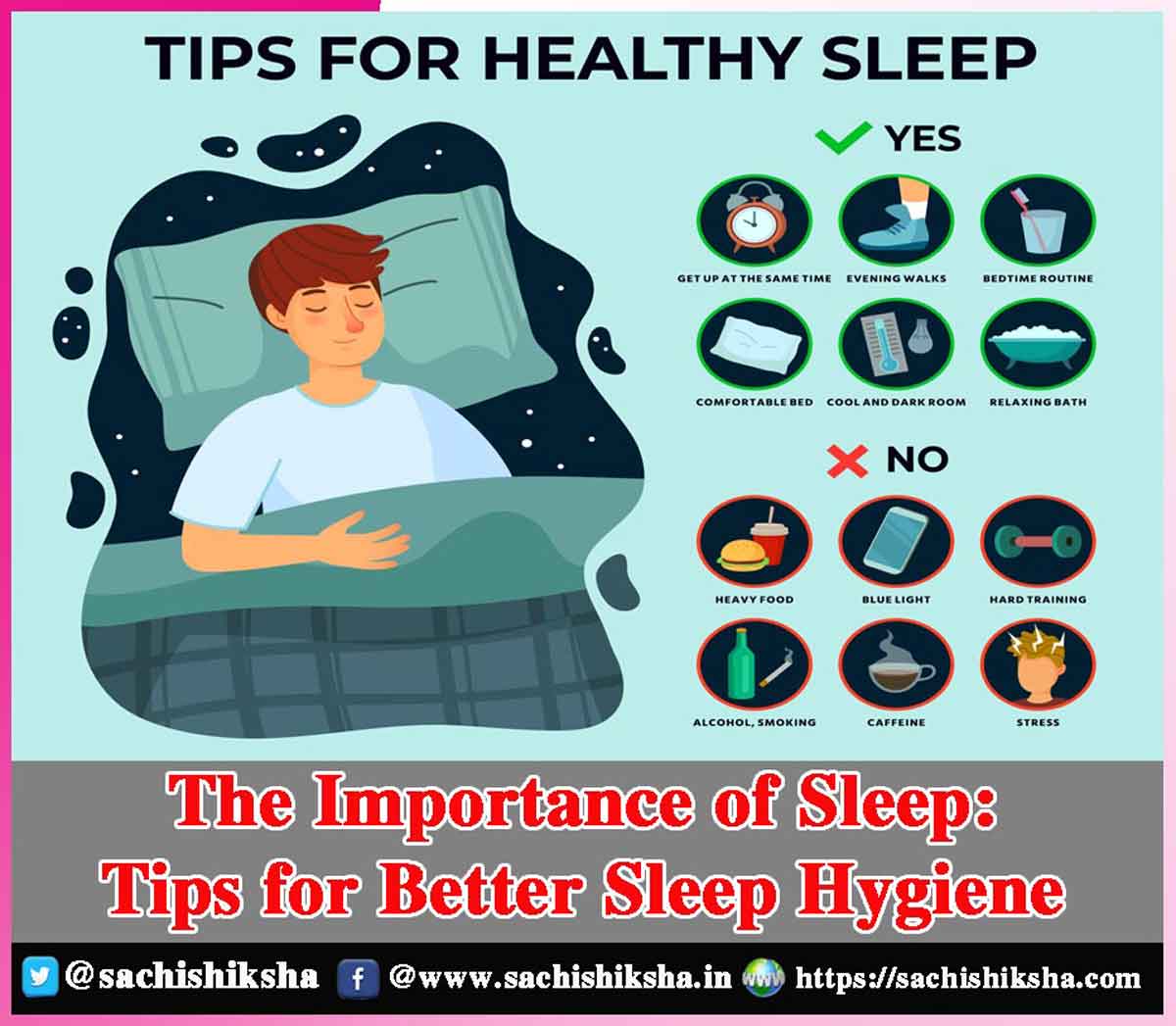The Importance of Sleep: Tips for Better Sleep Hygiene
Introduction: In a world where productivity is often prioritized over rest, the importance of sleep cannot be overstated. Sleep is not merely a period of rest but a crucial physiological process essential to preserving general health and well-being.
Unfortunately, many underestimate the significance of sleep and often sacrifice it for work, social activities, or entertainment. However, this neglect costs a lot, as persistently lacking sleep can significantly impact one’s physical well-being, cognitive function, emotional well-being, and quality of life. In this article, we will delve into the importance of sleep and provide practical tips for improving sleep hygiene to promote better sleep.
Table of Contents
The Importance of Sleep

Many health benefits are linked to getting enough sleep, such as:
Enhanced Cognitive Function:
Cognitive functions like learning, memory, problem-solving, and decision-making depend heavily on sleep. The brain integrates information and consolidates memories when we sleep, which enhances cognitive function and performance in school or the workplace.
Improved Mood and Emotional Wellbeing:
Getting enough sleep is essential for controlling emotions and mood. Chronic sleep loss can result in anxiety, melancholy, mood fluctuations, irritability, and elevated stress levels. Conversely, adequate sleep promotes emotional resilience and stability, helping people deal more effectively with life’s obstacles.
Enhanced Immune Function:
A robust immune system depends on getting enough sleep. As you sleep, the body produces cytokines and other immune factors that help fight off infections and diseases. People who experience long-term sleep deprivation are more vulnerable to infections and illnesses such as colds and the flu as a result of compromised immune systems.
Better Physical Health:
Quality sleep is essential for maintaining overall physical health and wellbeing. Adequate sleep supports cardiovascular health, regulates blood pressure, promotes healthy metabolism and weight management, and reduces the risk of chronic conditions such as diabetes, obesity, and cardiovascular disease.
Enhanced Productivity and Performance:

Despite its importance, many individuals struggle to obtain sufficient and peaceful slumber due to multiple elements like job obligations, lifestyle choices, technology use, stress, and sleep disorders. However, adopting healthy sleep habits and enhancing the length and quality of sleep is achievable with proper sleep hygiene.
Tips for Better Sleep Hygiene
Improving sleep hygiene involves adopting healthy habits and behaviors that promote restful and rejuvenating sleep. The following helpful advice will help you improve your sleep hygiene:
Establish a Consistent Sleep Schedule:
Go to bed and wake up simultaneously every day, even on the weekends. Consistency helps regulate your body’s internal clock and promotes better sleep quality. Aim for 7-9 hours of sleep per night, depending on individual needs.
Create a Relaxing Bedtime Routine:
Develop a relaxing pre-sleep routine to signal your body that it’s time to wind down. You can de-stress and get ready for sleep by reading, taking a warm bath, meditating, deep breathing, or listening to relaxing music.
Create a Comfortable Sleep Environment:
Optimize your bedroom’s temperature, lighting, noise levels, and mattress comfort to make it conducive to sleep. Keep it dark, quiet, and calm, and spend money on supportive pillows and a cozy mattress.
Limit Exposure to Screens Before Bedtime:
Electronic devices like TVs, PCs, tablets, and cell phones generate blue light, disrupting your body’s sleep-wake cycle. Avoid screen time at least an hour before bedtime, or use blue light filters or night mode settings to minimize exposure.
Avoid Stimulating Activities Before Bedtime:
Engage in calming activities before bed and avoid stimulating activities that disrupt sleep, such as intense exercise, heavy meals, caffeine, and alcohol consumption. Opt for light snacks if hungry and avoid large meals close to bedtime.
Manage Stress and Anxiety:
Practice stress management techniques such as mindfulness, relaxation exercises, journaling, or therapy to alleviate stress and anxiety that may interfere with sleep. Establish a time during the day to address concerns and avoid ruminating on them at night.
Limit Naps During the Day:
While short naps can benefit some individuals, excessive daytime napping can disrupt nighttime sleep patterns. Limit naps to 20-30 minutes and avoid napping late in the day, as it may interfere with your ability to fall asleep at night.
Watch Your Caffeine Intake:
Reduce the number of caffeinated drinks, such as soda, coffee, and tea, especially in the afternoon and evening. Avoid caffeine close to bedtime as it is a stimulant that can disrupt the length and quality of your sleep.
Seek Professional Help if Needed:
If you continue to experience persistent sleep problems despite implementing these strategies, consider seeking guidance from a healthcare professional or sleep specialist. He can help identify underlying sleep disorders or issues and provide personalized treatment options tailored to your needs.
Conclusion
A vital component of human health and well-being is sleep. And yet, in today’s hectic world, it is frequently overlooked and underappreciated. Getting enough sleep is essential for mental clarity, emotional stability, physical health, and general quality of life.
You may increase the quality and duration of your sleep, improving your performance and productivity. You will also gain many health benefits by prioritizing sleep and developing healthy sleep habits. Incorporate these practical tips for better sleep hygiene and introduce restorative and revitalizing sleep into your everyday schedule to experience its benefits. Recall that getting enough sleep is essential for living a happy and whole life, not a luxury.
















































